Do you have a fat cat? Or a chonky cat? Is your cat overweight but not overeating? The Association for Pet Obesity Prevention has released the latest results of its annual survey. They say that “cats carry the largest share of the obesity burden with 61 percent of the population recorded as overweight or obese.” This is alarming and unfortunately, it’s not very surprising.
In this article you’ll learn why cat obesity is a problem, how to tell if your cat is overweight, and the 4 top causes of obesity in cats with solutions.
The lives of our cats, not to mention our own lifestyles, have changed dramatically over the past several decades. The once mighty hunter is now a chubby observer. Why? Here are four of the most common causes of obesity in cats that we see regularly in our veterinary clinic. We also have provided suggestions to resolve them. If you resolve these issues, your cat can get back to their ideal weight. Your chubby cat can once again be fit, healthy, and happy.
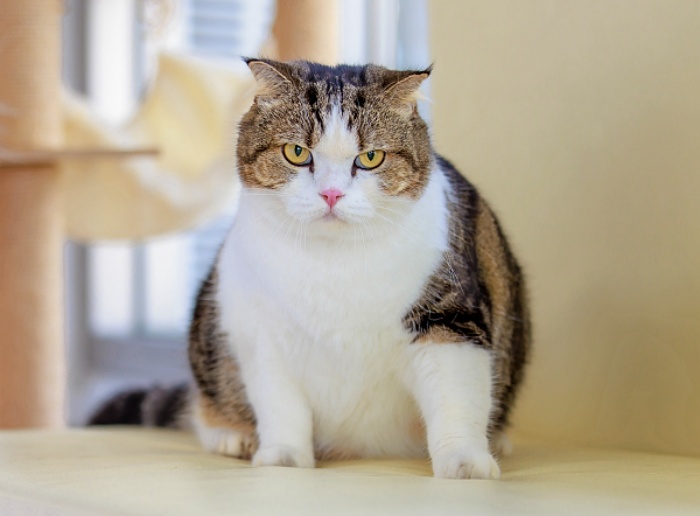
Table of Contents
- Why being overweight is a problem
- How do I know if my cat is overweight?
- Why is my cat fat? Top 4 causes of obesity
- Summary
Why being overweight is a problem
Being overweight is a serious problem for cats that can lead to a number of health issues. When your cat is over their healthy weight, it can result in difficulties with movement, increased stress on joints, and compromised organ function. It can also put a strain on the cardiovascular system and lead to type 2 diabetes, as well as other metabolic disorders. Further, obesity has been linked to an increased risk of certain types of cancer such as lymphoma and mammary tumors.
Putting your cat on a diet seems simple enough, but please consult with your veterinarian to develop a plan to properly remove the excess weight your four legged fur ball is carrying around.
How do I know if my cat is overweight?
There are a few quick ways to check if your cat is at their target weight. First, how do they look? If your cat has a rounded belly from a side view, that’s an indication. Stroke your cats side along their rib cage. You should be able to feel their ribs with a little fat over them. Can your cat jump with ease? Cats are excellent jumpers and climbers. If they are having trouble getting to the top of their cat tree or can’t jump up on their cat shelf, that too may be signs of being overweight or obese. Here is an excellent cat obesity chart from the Association of Pet Obesity Prevention.
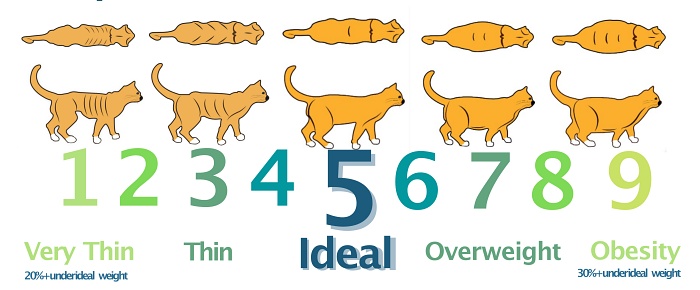
Why is my cat fat? Top 4 causes of obesity
Here are the 4 main reasons why your cat may be obese.
1. Low activity level and sedentary lifestyle
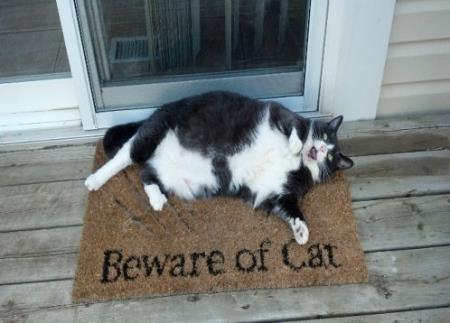
The number one cause of feline obesity, without a doubt, is a sedentary lifestyle. You probably already know that there is one simple equation that can explain weight gain:
Calories stored in fat = Calories consumed − Calories spent
If your cat spends fewer calories than he or she actually consumes every day, the excess is stored. This is due to the feast or famine that cats went through long before they were domesticated. Similar to we humans, cats bodies evolved to survive when their food sources such as mice weren’t as abundant. The body stores any extra calories as body fat to be used later. Unfortunately, in household situations, the day of fewer mice never comes. The bowl is always full, and the only activity a cat has to engage in to fill it is to meow. This is a simple recipe for adding extra pounds.
The sad truth is that the majority of pet cats don’t expend nearly as many calories as they used to. We love having our cats live indoors, but this unfortunately leads to lack of exercise. This is simply because cats turn into couch potatoes. Their physical activities become dependent upon their pet owners involvement.
Solution: get an interactive toy and play with your cat for 10 minutes at least twice daily. It’s ideal to do this before you provide your cat with a meal. This mimics their natural hunting instinct where they expend energy hunting their next meal. This bare minimum will surely go a long way. If you’re ready to be more creative, here’s a list of 11 ways to have fun with your cat.
2. Overfeeding
While low activity is one of the biggest problems indoor cats face nowadays, a second problem is that catsare fed too much. We very much understand how difficult it is to reduce your cats food intake when they meow at you and stare at you with those big sad eyes. That said, there may be several occasions in which cats might receive too much food:
- Free feeding. This usually means filling the food bowls with dry food and then adding more when they are half empty. Having a bowl of food always available is not advisable. This is a common contributor to obesity in cats. There are so many problems with giving free food access to your cat. The biggest problem is that eventually your cat will eat too much because you can’t control how much your cat eats. This is especially true if you have more than one cat like we do.
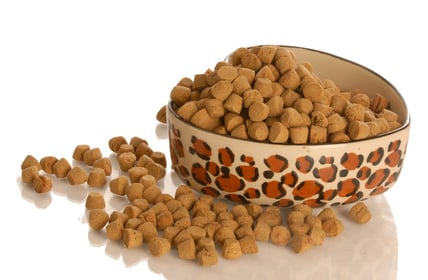
Too much food. Again, this is very similar to free feeding. Even if you provide food to your cat in meals at the same time of day (bravo if you do !), do you weigh out their daily required amount and feed accordingly?
Solution: Read the label on package and measure out the lowest amount necessary for your cat’s ideal (not current) weight, and feed no more. We use a measuring cup that is just for our pets food. We have one for our both our dogs and cats. If you aren’t sure, please work with your veterinarian.
Treats and table scraps. It’s totally okay to give some treats to your cat if he or she enjoys them. Treats are also necessary if you are training your cat. Continue providing them, but subtract the corresponding amount from your cat’s daily food intake.
Not considering activity changes at a certain age. Most cat owners know that their cat will become less active as they mature. Kittens play a lot while adults spend more time lounging on their cat tree. But did you know that your cat’s energy requirements are reduced slightly from year to year.
Solution: You should slightly lower the amount of food you put in their food bowl for your cat over the years. This is because the older your cat grows, the less food they need. In fact, a senior a cat may require up to 20% less food than they did as a young adult.
Not reducing the amount of food after neutering or spaying. There’s a common cat myth that neutering causes obesity in cats. In reality, neutering and spaying do not cause obesity. However, there’s no smoke without a fire right? Neutering significantly reduces your cat’s activity level. This is understandable because no sex drive means they no longer need to actively look for a mate. That’s why their energy requirements decrease.
While humans have been doing fasting for centuries, your cat’s physiology is different. Cats and even dogs that are not fed for as little as 2 days or undergo rapid weight loss can develop fatty liver disease or hepatic lipidosis.
Feeding too much will result in weight gain and feeding too little can result in serious health consequences such as hepatic lipidosis. Your veterinarian can exam your cat to ensure they have no underlying health issues prior to starting them on a weight loss plan. This will help your cat get back to their ideal weight by losing the weight per week at an appropriate pace.
Solution: What you need to do is either feed less or initiate more activity in your cat. We like to use a laser pointer prior to feeding time. It’s fun to watch our cats chase the little red dot all over the living room.
3. Poor diet
While this is a less common causes for cats, we still see it. Eating junk food or poor quality cat food can cause excess weight to build up. Just like in we humans, junk food like fried foods, sugar ladened snacks, and highly processed foods can cause obesity. But what is junk food for cats?
In nature, cats eat live prey, some insects, and maybe a few blades of grass. This is a diet that is mostly rich in protein, moderate in fats, and with virtually no carbohydrates. What do most commercial, especially dry, foods consist of? Moderate protein, slightly higher fat, and a large amounts of carbohydrates. We’ve seen that many high quality canned wet food provides a better balanced meal. And our cats seem to like it much better.
Good cat food:
- Contains identified meat as the first ingredient
- Contains high amounts of protein, a moderate amount of fat, and almost no carbohydrates
- Contains no or very little grain
- Check here for other properties that a good cat food should have
By feeding your cat the highest quality cat food you can afford, their weight will begin to drop and they will get back to their ideal body weight.
4. Medical conditions
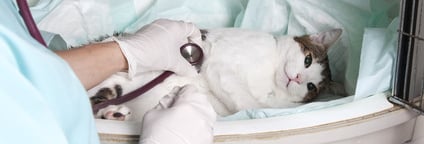
Last but not least, there are several medical conditions that cause cats to become overweight or obese. A medical condition can be the reason that your cat is overweight but not over eating. The most common of these are Diabetes Mellitus, hypothyroidism, and hyperadrenocorticism.
There are other, less common diseases as well, so this is why you should visit your veterinarian if your cat is carrying around extra weight. If your cat is ill, putting them on a diet without treating the medical cause may make matters worse.
Summary
The top 4 causes mentioned above are the most common causes of obesity in cats. Sometimes cat owners tell us that they are proud of their cats being “plus” size and/or that it fits their personality. But is that in the best interest of your cat? You are responsible for your cats quality of life. When they have a weight issue, they can have health issues. When they are at their optimal weight, they will be healthier.
You have learned why cat obesity is a problem, how to tell if your cat is overweight, and the 4 top causes of obesity in cats with solutions. By maintaining your cats weight, they’ll be healthier and happier. And keeping your Pet Happy is what we all want.
This article is a part of series about fighting obesity in cats.
